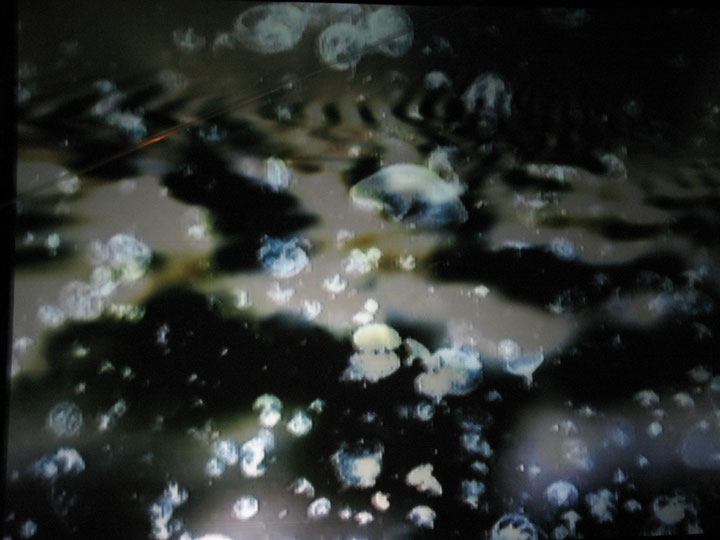krefeld, elisabethstraße 52, two at night on the phone
i should catch my breath, right, catch my breath first before I carry on. said no-one could understand me, no-one could understand what i was trying to say. so take a deep breath in, deep breath out, right? breathing out, she’d heard, is so easy to forget. though breathing out is more important than breathing in, she didn’t know why. maybe because used air is worse for you than no air at all, thought she couldn’t imagine that, she’d always preferred used up air to none at all, because you can still get some oxygen even out of used up air.
so first of all i should explain what i’m saying nice and calmly and most important of all, I should tell the whole story from the beginning, so that it makes sense, one thing after another, not the other way round. otherwise she’d imagine god knows what. she’d think god knows what had happened and i wouldn’t be wanting her to get all in a panic, it’s bad enough if one of us gets all worked up.
*
fine. have i calmed down now? can i talk normally now? i sounded so quiet. maybe i want a drink of water?
*
»wonderful, then let’s start at the beginning then«, i’d always been so good at that, starting at the beginning and telling the whole story, that had always been right up my street, whereas she had always had to think about it for ages – although, if she sees things right, if i’d known sooner where to start, i’d have had more idea of where i was trying to go and she unfortunately didn’t want to go there, she could tell me that, that’s somewhere she knew very well already.
*
what? hadn’t she been listening to me when i was talking about the water, about the water with its water temperatures, with its flow rates and its salt content? hadn’t she heard today, for example, about how the particles communicate with each other, how they carry information for tens of thousands of kilometres. »aha, is that how it goes!« she saw that today it was hard work getting the connections out of me, though basically she didn’t even want to get them out of me, she’d rather switch off. but switching off isn’t allowed, now is it? Well, the only thing you can switch off is the underwater waterfall that drives the gulf stream and only in your mind’s eye to imagine what would happen, if an ice age were to break out in europe in ten years like i promised.
in that respect she was surprised that she hadn’t heard anything about sea water yet. It probably seeped out in our last conversations, they were all on the phone, if her memory served here well, you don’t really get a chance to talk to me face to face. and yet she was impatient for our night-time talks, lived for quite some time waiting expectantly for lectures on plankton. you shouldn’t refuse to listen to all of that, but should always keep your ears open, isn’t that right?
certainly, she never managed to keep them open all the time, she got cold feet at the thought. but someone like me wouldn’t get cold feet. someone like me doesn’t ever wonder either whether it’s appropriate to mention sea water in our conversation, right this very instant, the flourishing types of seaweed with their flourishing seaweed bloom, turning the waters of the pacific for example red because of their iron content – at this very moment. at this very moment it’s happening, that’s what i’d shouted. well, who’s really on first-name terms with the waters of the pacific and its iron content, on first-name terms with nitrogens and nitrates, first-name terms with volatile particulates, the basis of some food chain or other that surely leads straight to us?
but i’m not the only one to have a right to certain expressions that are part and parcel of everyday meteorology, i had no prerogatives over terms like »el niño« or »north atlantic oscillation« just like i wasn’t the sole owner of climate data. she herself for example could, if she wanted, call a spade a spade, even if it sounded very different when she said it. possibly it’d sound stumbling to me, maybe she’d not have enough elegance, or verve, but when i spoke even the pressure differentials between low pressure over iceland and high pressure over the azores sounded highly dangerous. in my mouth a term like »polar drift« automatically makes you think of decline, of an apocalyptic event. but she hasn’t lost her nerve, she’s taken some of this vocabulary on board and sort of taken the sting out of it.
*
she reckons »it’s not surprising nature’s taking its revenge«, that’s the kind of statement she’d expect from me, though she doesn’t know whether she could entirely agree with me, that is, if you could really describe what’s going on out there as revenge, after all she’d always imagined some kind of animal involvement in revenge of nature and here there actually isn’t any animal involvement to be seen. in other words, herds and swarms, packs and flocks, mass migrations from left to right, from right to left, whatever, but here there’s no animals and no surprising animal behaviour. no animals suddenly crossing the road, the revenge of frogs and snakes was as non-existent as that of the reptiles and fish, the birds and insects, who you really could believe would be capable of anything in this context. the revenge of the rodents and domestic animals, seem to have forgotten about them. »nature takes revenge differently«, i would normally say now, but i don’t say so, which is a shame, for then you could come up with the forest fires. –
*
as if i didn’t know: forest fires are nothing unusual around there. On the contrary. They are part of the natural cycle and if there weren’t any forest fires then certain vegetation wouldn’t be there either, then certain bushes that are native to this region would die out, and we want that, don’t we, local things from this region?
at least there’s been talk about it for quite a while now, she didn’t really get it, but the biologists and landscape artists I met on my californian trip always demanded just that.
they set things alight themselves here, they started controlled fires, she had heard me shouting that into the phone more than once: certain conifers don’t exist any longer, deciduous trees that need the soot, that need the scorching, she had always thought there’s no such thing as masochistic plants, but she’d been put straight on that one, she had imagined nature having a strict will to survive, a principle of prospering, but she had had to admit I was right. and now I better admit she’s right for once – a peculiar way of going about things, isn’t it? especially admitting someone’s right when you didn’t even really want to notice them beforehand.
from: die alarmbereiten by kathrin röggla, published in March 2010, S. Fischer Verlag.
Translated by Helen Ferguson




